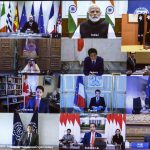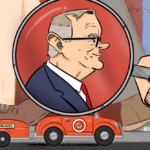On being a teacher
Teaching requires dedicated professionals who promote the significance of investing in equity and excellence in education. Paul Grover, who has won the national teacher educator of the year award, describes the responsibility and privilege of being in this profession.
Receiving a national teacher educator award in 2014 has challenged me to reflect on a 35+ year career as a high school teacher and university lecturer in Australia, and to consider the changes that have impacted on teachers, students and the profession. There is also a challenge to look ahead – by shining a light on the past we provide a spotlight for the future.
My professional career perspective has always been to ensure that the work is, as far as possible, ‘serious fun’. It has been both a privilege and a pleasure to work among young adults, no matter what their age. During my last few years as a high school Head Teacher I sensed a desire to give something back to the teaching profession, and so I seized an opportunity to contribute to the preparation of future teachers at Charles Sturt University. This role has allowed me to share a little of the wisdom, the experience and the insights that I have gleaned from a long and fulfilling career working beside so many wonderfully inspiring and professional teachers, and the many more thousands of young adults who have been our high school students.
I particularly look back to my own teacher mentors. I completed my undergraduate BADipEd teaching degree at Macquarie University in the mid-1970s. This course seconded talented and highly-experienced secondary teachers to the university for a specific time period, allowing them to share their expertise, wisdom and experience. My two significant teacher mentors were Mandy Tunica in English curriculum, who went on to become an English Inspector in NSW schools, and during retirement a tireless supporter of the Primary English Teachers’ Association, and Sam Weller in History curriculum, who went on to become President of the NSW Board of Studies.
During the past four years at Charles Sturt University I have learned a great deal about the profound complexities of teacher education in the contemporary political and economic climate, the dynamic changes taking place within the sector, the enormous political influences at play and the passion and commitment of so many talented teacher educator colleagues. Our future teachers do not realise how many thousands of hours are invested in the development of rich subject content, authentic and creative learning experiences, and fulfilling assessment activities, that are all designed to enhance their professional knowledge, skills and teaching practice. We are now facing enormous challenges in Australia in areas of teacher accreditation, teacher accountability, national testing and the commitment of governments to ensure a quality education for all. The teaching profession requires dedicated, highly-skilled and politically aware professionals who will unrelentingly promote the value and significance of investment in equity and excellence in education for the future of Australia’s people and the future of this planet.
The teaching profession is such a powerfully important and valuable profession in the world today, and I wholeheartedly endorse the words of the American commentator, John Wooden, who last century declared,
‘I think the teaching profession contributes more to the future of our society than any other single profession.’
We as teacher educators carry an enormous responsibility for future generations of teachers and their students, and it is an enormous privilege to work beside enthusiastic, passionate and inspiring future professional educators.
The Pulitzer Prize winning poet Mary Oliver concludes her poem ‘The Summer Day’ with this profound question,
‘Tell me, what is it you plan to do
with your one wild and precious life?’
This is one question we should ask ourselves and that we should also ask our students, and it is a question our students should ask of their own students – and ask in ways that kindle, enthuse and inspire their passion for life and for this precious planet.
Paul Grover in an education lecturer with Charles Sturt University’s School of Education. Paul worked as a secondary English and History teacher and Head Teacher for 35 years. He has also worked with the NSW Board of Studies for more than 15 years as a syllabus committee member, HSC examination Supervisor of Marking and Coordinating Supervisor of Marking, and HSC English examination Assessor. Over the past 25 years, Paul has written and edited an extensive range of secondary school English and History course and resource books for students and teachers. His latest books are a new series of print and online English language and literacy skills books for the new Australian curriculum.











